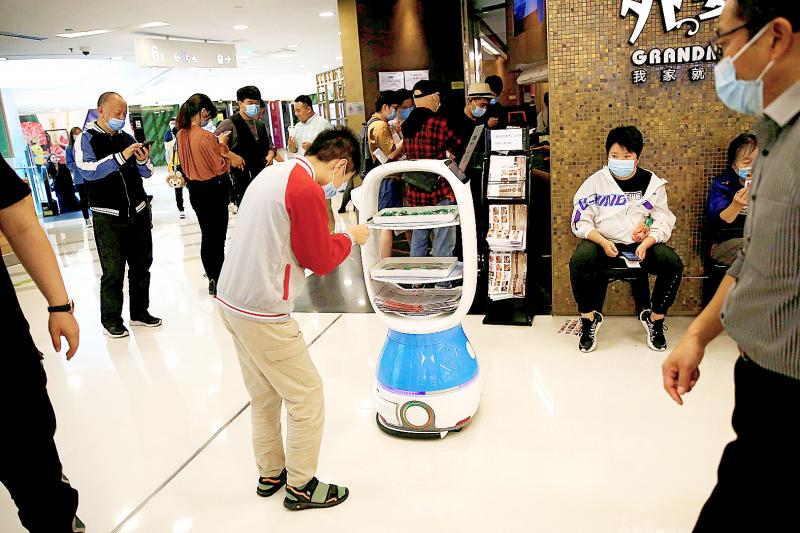While China’s coastal provinces and major cities are recovering from the COVID-19 pandemic, firms in its poorer western and central provinces are falling well behind in metrics such as output and sales revenue, a private survey showed yesterday.
The majority of firms are recovering far more slowly than those in wealthier areas around Beijing, Shanghai and Guangdong, a report from China Beige Book International (CBB) said.
While revenue and profits for the third quarter saw steep declines year-on-year across China, many interior provinces also saw output, domestic orders and sales prices falling from the second quarter as well, according to a quarterly survey of thousands of Chinese firms by the US-based consultancy.

Photo: Reuters
For instance, revenue increased 41 percent quarter-on-quarter for Shanghai and the wealthy eastern provinces of Zhejiang and Jiangsu, but fell by 10 percent in the more remote western regions of Tibet, Gansu, Qinghai and Xinjiang, it said.
“For the corporate elite — large firms and those based in the Big 3 coastal regions — the economy is accelerating... But the rest of China — most firms in most regions — are seeing a far more muted recovery,” CBB chief economist Derek Scissors said in comments issued with the survey.
Last month, China’s industrial output accelerated the most in eight months, while retail sales grew for the first time this year, suggesting the economic recovery is gathering pace as demand starts to improve more broadly from the COVID-19 crisis.
However, the retail recovery is unbalanced and spending on luxury goods, vehicles and electronics is leading the charge, rising faster than food, clothing and other essentials.
While the supply side of China’s economy has shown resilience, a strong and broad rebound in spending is needed for a more meaningful economic recovery. Even though the virus is under control, income and job losses due to the pandemic have made poorer Chinese unwilling or unable to increase spending, keeping a lid on the rebound.
“Higher-income households have probably built up savings, because of the forced reduction in consumption during lockdown, and could now be ready for a spending spree. It is lower-income households that face a longer slog of normalizing their finances,” Gavekal Dragonomics (龍洲經訊) analyst He Wei (何暐) said in a recent report.
The lopsided recovery can also be seen in the auto market.
Sales of luxury vehicles have recovered much quicker than regular ones, and are now almost one-fifth of all vehicles sold.
Regional divergences were also visible in credit, CBB said, with a far higher proportion of companies in the wealthy areas around Beijing, Shanghai and Guangdong accessing capital.
“Borrowing levels stayed flat or fell outright in 4 of 5 non-coastal regions,” CBB said in the report.
Additional reporting by Bloomberg

RUN IT BACK: A succesful first project working with hyperscalers to design chips encouraged MediaTek to start a second project, aiming to hit stride in 2028 MediaTek Inc (聯發科), the world’s biggest smartphone chip supplier, yesterday said it is engaging a second hyperscaler to help design artificial intelligence (AI) accelerators used in data centers following a similar project expected to generate revenue streams soon. The first AI accelerator project is to bring in US$1 billion revenue next year and several billion US dollars more in 2027, MediaTek chief executive officer Rick Tsai (蔡力行) told a virtual investor conference yesterday. The second AI accelerator project is expected to contribute to revenue beginning in 2028, Tsai said. MediaTek yesterday raised its revenue forecast for the global AI accelerator used

TEMPORARY TRUCE: China has made concessions to ease rare earth trade controls, among others, while Washington holds fire on a 100% tariff on all Chinese goods China is effectively suspending implementation of additional export controls on rare earth metals and terminating investigations targeting US companies in the semiconductor supply chain, the White House announced. The White House on Saturday issued a fact sheet outlining some details of the trade pact agreed to earlier in the week by US President Donald Trump and Chinese President Xi Jinping (習近平) that aimed to ease tensions between the world’s two largest economies. Under the deal, China is to issue general licenses valid for exports of rare earths, gallium, germanium, antimony and graphite “for the benefit of US end users and their suppliers

Dutch chipmaker Nexperia BV’s China unit yesterday said that it had established sufficient inventories of finished goods and works-in-progress, and that its supply chain remained secure and stable after its parent halted wafer supplies. The Dutch company suspended supplies of wafers to its Chinese assembly plant a week ago, calling it “a direct consequence of the local management’s recent failure to comply with the agreed contractual payment terms,” Reuters reported on Friday last week. Its China unit called Nexperia’s suspension “unilateral” and “extremely irresponsible,” adding that the Dutch parent’s claim about contractual payment was “misleading and highly deceptive,” according to a statement

Artificial intelligence (AI) giant Nvidia Corp’s most advanced chips would be reserved for US companies and kept out of China and other countries, US President Donald Trump said. During an interview that aired on Sunday on CBS’ 60 Minutes program and in comments to reporters aboard Air Force One, Trump said only US customers should have access to the top-end Blackwell chips offered by Nvidia, the world’s most valuable company by market capitalization. “The most advanced, we will not let anybody have them other than the United States,” he told CBS, echoing remarks made earlier to reporters as he returned to Washington